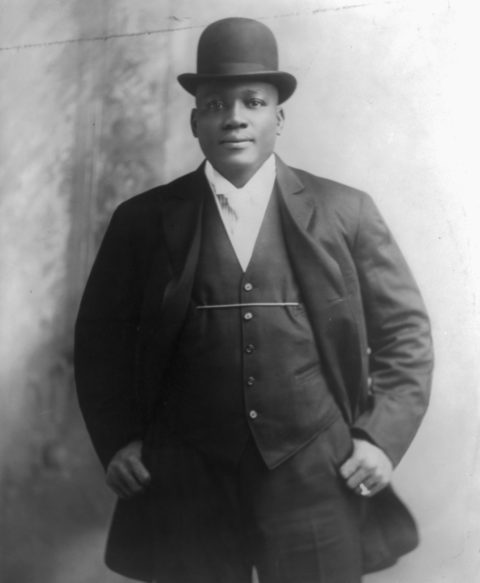Historian: Boxer’s story from century ago still speaks to how black athletes treated
Falcon News Service
April 17, 2019
The story of Jack Johnson, who more than a century ago became the first African-American world heavyweight boxing champion and whose race was an issue in news coverage of the day, still resonates today, according to a UW-River Falls history instructor.
Samuel Gale, an adjunct instructor of history, will be the keynote speaker Friday during the annual History and Philosophy Banquet. His speech, “Escaping Jack Johnson’s Shadow: Race & Sports in the 20th Century U.S.,” will examine the cycles of political activism that African-American athletes have endured since the early 1900s. Gale said his speech will go into detail about three African-American athletic pioneers in heavyweight boxing: Jack Johnson, Joe Louis, and four-time Olympic Gold medalist Jesse Owens.
“I’m going to focus on the beginning of the 20th century and look at Jack Johnson’s boxing career and how his actions inside the ring and more importantly how he acted outside of the ring so completely challenged the culture of white supremacy,” Gale said.

Johnson became the first African-American to win the world heavyweight championship in 1908 after defeating Tommy Burns, a white boxer. He would hold onto the title for seven years.
“The heavyweight title was the crown. It was that way when Jack Johnson won it and it was that way when Joe Louis won it,” Gale said. “It was seen as the centerpiece of manhood. The strongest and most powerful man in the United States or the world was the heavyweight champion.”
Johnson’s boxing victory over a white man heightened racial tensions, while his public and private life beyond the ring was examined critically by a number of newspapers.
Despite Johnson last holding the title over a century ago, Gale said he believes that black athletes today still feel the repercussions of Johnson’s actions.
Gale said, “I think the manner in which African-American athletes have to present themselves, whether how they act on the field of play and how they carry themselves off the field, the language they use, the advertisers they work with, their public demeanor is still in different ways filtered through sort of responding to the blowback to how Johnson acted.”
Gale contends that despite his talk being largely historical, the topics he will discuss have modern relevance in the United States. He cites current National Basketball Association players LeBron James, Dwayne Wade, Chris Paul and Carmelo Anthony as modern-day examples of African-American athletes who are “using their platform to speak out against racial inequality and social injustice.”
“Twenty years ago black athletes didn’t do that,” Gale said, “so it seems somewhat new and out of place, but if we go back across the century we see that African-American athletes have gone through cycles of activism and retreating from using that position.”
Gale said he believes that the standards imposed on athletes are not equal for those who are African-American. For example, if a black athlete uses social media to criticize the U.S. president or other citizens they are considered to be “stepping out of line.”
“There is still a sense that African-American athletes have to navigate a very tricky terrain,” Gale said. Another modern-day example Gale mentions is former San Francisco 49ers quarterback Colin Kaepernick, who famously took a knee during the pre-game singing of the national anthem to protest police brutality and inequality.
The different standards that Gale said Kaepernick and other black athletes have to endure is supported by a 2015 study by University of Missouri Professor Cynthia Frisby, which showed that media stories on black athletes primarily focus on criminal actions while stories about white athletes are overwhelmingly positive. The study found that 53 percent of news stories about African-American athletes had a negative tone compared to 27 percent of stories for white athletes.
River Falls native and UWRF alumnus Ace Sauerwein, now a sports director at radio station KDDR-AM in Oakes, North Dakota, said he believes the backlash of Kaepernick’s off-the-field actions has kept him out of the National Football League since the end of the 2016 season.
“The off-the-field issues definitely were the big reason he was not on a team, because he led a team to the Super Bowl,” Sauerwein said. “It’s very hard for me to believe that 32 starters plus at least 32 backups were better than Colin Kaepernick.”
Sauerwein said believes that sports media outlets like ESPN, CBS and Fox Sports covered the Kaepernick storylines ad nauseam because there was “some real drama to it.”
The History and Philosophy Banquet begins at 6 p.m. Friday in the University Center. For further information, telephone the Department of History and Philosophy at (715) 425-3164.
